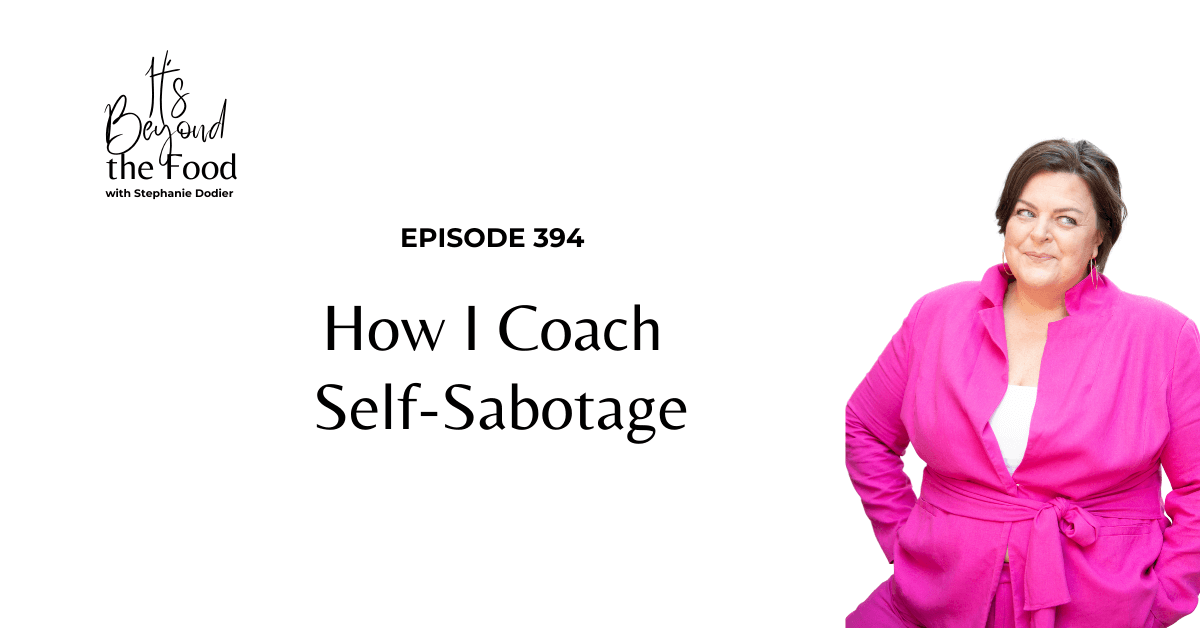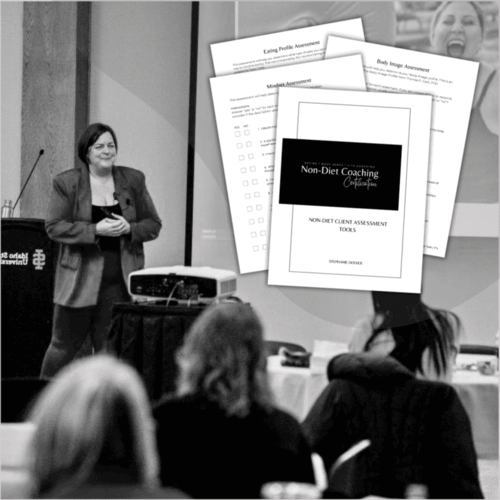How I Coach Self-Sabotage: A Fresh Perspective on Personal Growth
Are you tired of feeling stuck, despite your best efforts to move forward? You’re not alone. As a non-diet nutritionist and certified coach with a Ph.D. in diet culture (yes, you read that right!), I’ve spent years unraveling the mystery of self-sabotage.
In this podcast episode, I’ll share my unique approach to coaching self-sabotage, helping you break free from old patterns and create lasting change.
Redefining Self-Sabotage: It’s Not What You Think
Self-sabotage is commonly defined as actions (or inactions) that prevent us from achieving our goals. But here’s where my perspective diverges from the norm.
Self-Sabotage: A Coping Mechanism, Not a Character Flaw
The internet often labels self-sabotage as a weakness, a lack of discipline, or insufficient willpower. I disagree. My years of experience and study in psychology reveal a different truth: people self-sabotage because they don’t feel safe.
This safety issue can be emotional, mental, or physical, operating on both conscious and unconscious levels. It’s not about your worth or intelligence; it’s about protection.
The Hidden Forces Behind Self-Sabotage
Unconscious Triggers: Past Traumas and Family Dynamics
Unconscious reasons for self-sabotage often trace back to our past. Consider my own experience: being publicly weighed at Weight Watchers at age 12. That’s not just embarrassing; it’s traumatic.
Other triggers can include family upbringing, bullying experiences, or deeply ingrained belief systems.
Conscious Choices: Creating Safety in Uncomfortable Situations
Sometimes, we’re fully aware of why we’re self-sabotaging. Years ago, I avoided my CrossFit gym because I knew what awaited me: yelling coaches and judgmental partners. My “self-sabotage” was a conscious choice to avoid rejection and stress.
The Diet Culture Connection: When Your Body Feels Threatened
Diet culture is a prime example of how self-sabotage serves as a safety mechanism. When we restrict food, our body interprets it as a threat. “Danger! We’re starving!” it screams.
Our innate fight-or-flight response kicks in, overriding willpower. That’s why diets don’t work—they try to bypass our most basic survival instincts.
My Approach: Cognitive Behavior Coaching
While traditional health coaching relies on accountability and discipline, I use cognitive behavior coaching, a science-based method that truly understands human behavior.
Step 1: Reframe Self-Sabotage
We start by redefining self-sabotage as a smart coping mechanism. You’re not broken; you’re trying to feel safe. Actions like procrastination or perfectionism are neutral—they say nothing about your worth.
Step 2: Investigate Root Causes
Next, we dig into why you’re behaving this way. I ask clients to write down all their thoughts about a specific goal, like exercise. What have you learned about it? How does it make you feel?
Often, we uncover feelings of anxiety, depression, or shame—the real culprits behind self-sabotage.
Step 3: Process Emotions
The hardest part? Sitting with these emotions. Our society offers endless distractions—phones, Netflix—to avoid feelings. But processing emotions is key to accessing safety.
Step 4: Choose New Thoughts
Here’s a game-changer: you can choose what you think. When I learned this, it was a “holy shit” moment. Those unsafe thoughts leading to self-sabotage? You can change them.
Step 5: Take Small Steps
Finally, we use techniques like “minimum baseline” to reintroduce feared activities in small bites. If exercise feels unsafe, it might take months to feel comfortable at a gym again—and that’s okay.
Self-Sabotage: Your Body’s Wisdom
I believe self-sabotage is your body’s innate wisdom signaling a need for change. It’s urging you to either leave an unsafe situation or transform your thoughts about it.
Consider my journey with fatphobia. As a fat woman, I can’t escape it—unless I diet again, which I tried for 25 years. No thanks! So, I’m changing my thoughts, as I shared in my recent podcast episode.
Be Patient, Be Kind
Changing self-sabotage behavior takes time, especially if you’ve been battling diet culture. If you’re cycling on and off a behavior, you’re likely not addressing self-sabotage safely.
But there’s hope. By reframing self-sabotage as a call for safety, not a personal failing, you can make lasting changes. It’s a journey of patience and self-compassion.
What you’ll learn listening to this episode:
- Why self-sabotage isn’t a sign of weakness, but a cry for safety
- How diet culture and perfectionism fuel self-sabotaging behaviors
- Practical steps to reframe self-sabotage and foster personal growth
Mentioned in the show:






